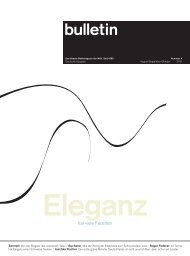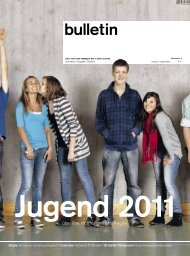Europe
From Crisis to opportunity Global Investor, 01/2014 Credit Suisse
From Crisis to opportunity
Global Investor, 01/2014
Credit Suisse
Create successful ePaper yourself
Turn your PDF publications into a flip-book with our unique Google optimized e-Paper software.
GLOBAL INVESTOR 1.14 — 42 1999<br />
Has Spanish<br />
competitiveness<br />
become more<br />
German?<br />
01_Harmonized competitiveness<br />
indicators<br />
The ECB (<strong>Europe</strong>an Central Bank) publishes<br />
competitiveness indicators (the lower the value,<br />
the better). Germany has improved its competitiveness<br />
since the Hartz reforms of 2005.<br />
Spain’s competitiveness has worsened since<br />
joining the Eurozone, but improved since the<br />
recession and following the reform. Since then,<br />
the country has been regaining ground<br />
vis-à-vis Germany. Source: ECB, Datastream, Credit Suisse<br />
<br />
120<br />
110<br />
100<br />
90<br />
80<br />
2001 2003 2005 2007 2009 2011 2013<br />
Spain Germany France<br />
n the late 1990s, the German economy<br />
showed little of the dynamism that<br />
characterizes it today. Unemployment<br />
rose fairly steadily after reunification in<br />
1990, despite comparatively robust GDP<br />
growth during that decade. An ambitious reform<br />
program termed “Agenda 2010” (a.k.a.<br />
the Hartz reforms), announced in 2003, tried<br />
to address certain shortcomings of the labor<br />
market. The Agenda 2010 legislation, most of<br />
which had become law by 2005, modernized<br />
the system of public employment agencies,<br />
reduced regulation of certain forms of employment<br />
(temporary employment, labor leasing),<br />
lowered barriers to layoffs and tied welfare<br />
benefits more closely to efforts to find<br />
employment.<br />
Labor market developments since re form<br />
implementation have been impressive: the<br />
number of employed individuals rose to an<br />
all-time high of 42.1 million from 39 million by<br />
the end of 2005, while the unemployment<br />
rate declined from 12.1 % to a post-reunification<br />
low of 6.7 % by May 2014. Although<br />
these numbers are indeed impressive, critics<br />
of the reforms argue that the quality of the<br />
new jobs created has been rather weak –<br />
focused to a large extent on manual and<br />
low-paid jobs. There may well be some truth<br />
to this claim. For example, the number of employees<br />
of so-called labor-leasing agencies<br />
has increased substantially since the market<br />
was opened up.<br />
In response to these criticisms, the German<br />
government is currently stepping back<br />
somewhat from the spirit of the Agenda<br />
2010 reforms, e. g. through the introduction<br />
of a federal minimum wage and discussions<br />
about lowering the retirement age for certain<br />
types of employees.<br />
The 2012 Spanish labor market reform<br />
While it took Germany several years to agree<br />
on reforming the labor market, the euro crisis<br />
forced Spain to follow a comparable path<br />
within a much shorter period of time. One of<br />
the key initiatives in this regard was the Spanish<br />
labor market reform announced in February<br />
2012. It had a significant impact on labor<br />
costs. Indeed, the OECD estimates that more<br />
than half of the 3.9 % decline in unit labor<br />
costs between Q4 2011 and Q2 2013 can be<br />
attributed to the labor market reform. Among<br />
the key adjustments were improvements in<br />
incentives for firms to hire as well as for individuals<br />
to look for work, e. g. by reducing<br />
severance payments and granting firms more<br />
flexibility in adjusting the size of their workforce.<br />
However, the reform fell short of (high)<br />
expectations. We view the labor market reform<br />
as an important step in the right direction,<br />
but we would like to see further progress<br />
on this issue. Still, the OECD estimates that<br />
the undertaking is responsible for the hiring<br />
of 25,000 employees with permanent contracts<br />
each month, especially among smalland<br />
mid-cap firms. We portray two Spanish<br />
small caps on page 44.<br />
Björn Eberhardt<br />
Global Macro Research<br />
+41 44 333 57 43<br />
bjoern.eberhardt@credit-suisse.com<br />
Javier J. Lodeiro<br />
Banking & Insurance Research<br />
+41 44 334 56 44<br />
javier.j.lodeiro@credit-suisse.com<br />
02_Unemployment rates<br />
in Germany and Spain<br />
Since 2005, the unemployment rate in Germany<br />
has nearly halved, also supported by the Hartz<br />
labor market reforms. Following the global<br />
financial crisis, the Spanish unemployment rate<br />
has shot up to levels beyond 25 %, well above<br />
the previous peak in 1994. Encouragingly,<br />
there have been early signs of improvement<br />
in recent months. Source: Datastream, Credit Suisse<br />
%<br />
30<br />
25<br />
20<br />
15<br />
10<br />
5<br />
0<br />
50<br />
1992 1997 2002 2007 2012<br />
Spain<br />
Rank (out of 148)<br />
1<br />
7 5 7<br />
22<br />
29<br />
22<br />
29<br />
Germany<br />
03_WEF competitiveness<br />
ranking puts Germany close<br />
to the top, with Spain still<br />
below its precrisis highs<br />
Germany has been assessed as a very competitive<br />
economy over the last eight years, without<br />
any substantial variability in its ranking. Spain’s<br />
competitive ranking has declined compared<br />
with precrisis levels, but the 2012 reform and<br />
the improved macroeconomic stability should<br />
lift its ranking back up again. Source: WEF, Credit Suisse<br />
22<br />
29<br />
7<br />
23<br />
33<br />
2007 2008 2009 2010 2011 2012 2013 2014<br />
Spain Germany Eurozone average<br />
5<br />
23<br />
42<br />
6<br />
23<br />
36<br />
6<br />
23<br />
36<br />
4<br />
24<br />
35

















